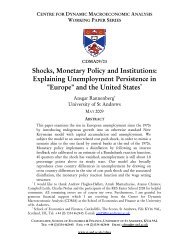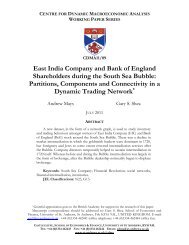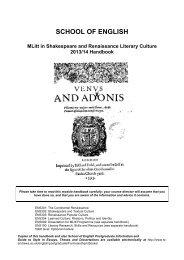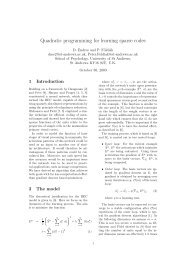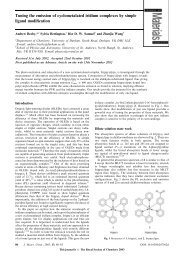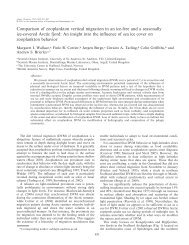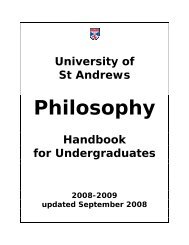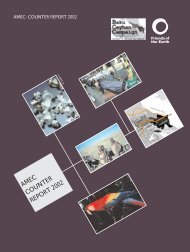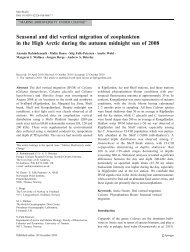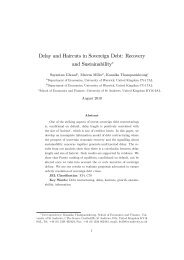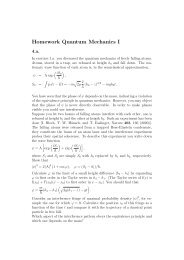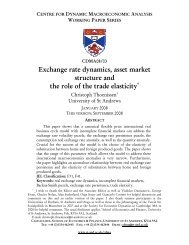guide to pre-advising in honours philosophy - University of St Andrews
guide to pre-advising in honours philosophy - University of St Andrews
guide to pre-advising in honours philosophy - University of St Andrews
You also want an ePaper? Increase the reach of your titles
YUMPU automatically turns print PDFs into web optimized ePapers that Google loves.
<strong>University</strong> <strong>of</strong> <strong>St</strong> <strong>Andrews</strong><br />
Department <strong>of</strong> Logic and Metaphysics and Department <strong>of</strong> Moral Philosophy<br />
GUIDE TO PRE-ADVISING<br />
IN HONOURS PHILOSOPHY<br />
<strong>in</strong>clud<strong>in</strong>g Logic and Philosophy <strong>of</strong> Science<br />
for 2013-14 module choices<br />
The Honours Philosophy Adviser is:<br />
Sarah Broadie<br />
Tel: (46)2494<br />
email: sjb15@st-andrews.ac.uk<br />
Before matriculat<strong>in</strong>g <strong>in</strong> September, you must confirm your academic programme for<br />
the whole year with the Honours Philosophy Adviser. Changes <strong>of</strong> modules will be<br />
permitted only <strong>in</strong> the first week <strong>of</strong> each semester, —and the Adviser must be consulted<br />
aga<strong>in</strong> for each change. Any changes <strong>of</strong> modules, <strong>in</strong>clud<strong>in</strong>g withdrawals, are<br />
unauthorised and may be disregarded unless the Honours Adviser has been consulted<br />
about them first.<br />
Honours Advis<strong>in</strong>g for Session 2013-14 will take place on Tuesday 10<br />
September from 10.00 until 16.30 and Wednesday 11 September from<br />
10.00 until 16.30 as follows:<br />
Junior Honours:<br />
Tues 10/9: students A – M 10.00 –12.30; students N - Z 14.00-16.30<br />
Senior Honours:<br />
Weds 11/9: students A – M 10.00 –12.30; students N - Z 14.00-16.30
CONTENTS<br />
1. Session Dates 2013-2014 2<br />
2. Aims and Objectives <strong>of</strong> the Honours Modules <strong>in</strong> Philosophy 3<br />
3. Admissions <strong>to</strong> Junior Honours <strong>in</strong> 2013 4<br />
4. Programme Requirements 5<br />
5. Honours Philosophy Modules <strong>of</strong>fered <strong>in</strong> 2013-2014 8<br />
6. Details <strong>of</strong> Non-Dissertation Modules for 2013-2014 9<br />
7. Details <strong>of</strong> Dissertation Modules 20<br />
8. Provisional List <strong>of</strong> Honours Philosophy Modules <strong>in</strong> 2014-2015 21<br />
1. Session Dates 2013-14<br />
Orientation Week: Week commenc<strong>in</strong>g Monday 9 September 2013<br />
Mart<strong>in</strong>mas Semester: Monday 16 September 2013 – Friday 20 December 2013<br />
Graduation: Friday 29 November 2013 (no teach<strong>in</strong>g)<br />
Revision Period: Monday 2 December 2013– Sunday 8 December 2013<br />
Exam<strong>in</strong>ations: Monday 9 December 2013 – Thursday 19 December 2013<br />
Christmas Vacation: Saturday 21 December 2013 – Sunday 5 January 2014<br />
Candlemas Semester: Monday 27 January 2014 – Friday 30 May 2014<br />
Spr<strong>in</strong>g Vacation: Saturday 15 March 2014 – Sunday 30 March 2014<br />
May Day Holiday: Monday 5 May 2014<br />
Revision Period: Saturday 26 April 2014 – Sunday 11 May 2014<br />
Exam<strong>in</strong>ations: Monday 12 May 2014 – Friday 30 May 2014<br />
Graduation: Monday 23 June 2014 – Friday 27 June 2014<br />
2
2. Aims and Objectives <strong>of</strong> Honours <strong>St</strong>udy <strong>in</strong> Philosophy<br />
The Honours modules are designed <strong>to</strong> build on the foundations laid by sub-Honours<br />
modules <strong>in</strong> <strong>philosophy</strong>. The programme gives students the opportunity <strong>to</strong> develop and<br />
broaden their <strong>in</strong>terests <strong>in</strong> <strong>philosophy</strong>, through his<strong>to</strong>rical study as well as discussion<br />
and evaluation <strong>of</strong> particular philosophical issues and problems.<br />
In addition, Honours modules are designed <strong>to</strong> equip students with a broad range <strong>of</strong><br />
personal and <strong>in</strong>tellectual skills which will not only enable students <strong>to</strong> complete their<br />
degree successfully but will also provide a foundation for further tra<strong>in</strong><strong>in</strong>g and <strong>pre</strong>pare<br />
them fully for their future careers.<br />
Amongst the broad range <strong>of</strong> personal and <strong>in</strong>tellectual skills the Philosophy<br />
Department recognises and develops are:<br />
<strong>in</strong>ter<strong>pre</strong>tative and critical skills<br />
<strong>in</strong>dependent learn<strong>in</strong>g and research<br />
oral and written communication skills<br />
constructive discussion skills<br />
<strong>in</strong>formation management<br />
and time and task management.<br />
The study <strong>of</strong> Philosophy at Honours is particularly geared <strong>to</strong> foster the follow<strong>in</strong>g skills<br />
and abilities:<br />
Analytical and Critical Th<strong>in</strong>k<strong>in</strong>g Abilities:<br />
<br />
<br />
<br />
<br />
The ability <strong>to</strong> identify and clarify assumptions and conceptual relationships.<br />
The ability <strong>to</strong> construct, evaluate and criticise arguments on a reasoned basis.<br />
The ability <strong>to</strong> recognise and employ a variety <strong>of</strong> argumentative strategies.<br />
The ability <strong>to</strong> diagnose where a view has gone wrong and where <strong>to</strong> put it right.<br />
Communication Skills:<br />
<br />
<br />
The ability <strong>to</strong> speak and write with clarity, <strong>pre</strong>cision, and rigour.<br />
The ability <strong>to</strong> communicate a complex po<strong>in</strong>t <strong>of</strong> view succ<strong>in</strong>ctly.<br />
Inter<strong>pre</strong>tative and Com<strong>pre</strong>hension Skills:<br />
<br />
<br />
<br />
The ability <strong>to</strong> master difficult texts and follows complex arguments.<br />
The ability <strong>to</strong> listen <strong>to</strong> and ap<strong>pre</strong>ciate different po<strong>in</strong>ts <strong>of</strong> view and values.<br />
The ability <strong>to</strong> recognise and evaluate one's own <strong>pre</strong>suppositions.<br />
3
3. Admission <strong>to</strong> Junior Honours <strong>in</strong> 2013<br />
For All Arts <strong>St</strong>udents:<br />
<br />
240 credits at sub-Honours, <strong>of</strong> which at least 80 should be at 2000-level.<br />
The absolute m<strong>in</strong>imum is 200 credits at sub-Honours, <strong>in</strong>clud<strong>in</strong>g at least 40 at second<br />
level. In such cases you must 'trail' the miss<strong>in</strong>g modules, i.e., take them <strong>in</strong> your Junior<br />
Honours year, and will need permission <strong>to</strong> do this. (Speak <strong>to</strong> the Honours Adviser<br />
about this at Pre-Advis<strong>in</strong>g <strong>in</strong> April/May if you are unsure.)<br />
For S<strong>in</strong>gle Honours Philosophy or Jo<strong>in</strong>t Honours Philosophy:<br />
At least 80 credits from PY1001-PY2103, <strong>to</strong> <strong>in</strong>clude PY1006 and grades <strong>of</strong> at least 11<br />
<strong>in</strong> 40 credits from PY2001-PY2103.<br />
For Jo<strong>in</strong>t Honours <strong>in</strong> Logic and Philosophy <strong>of</strong> Science:<br />
At least 60 credits from PY1001-PY2103, <strong>to</strong> <strong>in</strong>clude PY1006 AND grades <strong>of</strong> at least 11<br />
<strong>in</strong> both PY2001 Formal and Philosophical Logic and PY2002 Metaphysics and<br />
Science (these are 10 credits each) at first sitt<strong>in</strong>g.<br />
For those tak<strong>in</strong>g a Philosophy Honours module as part <strong>of</strong> a General Degree or<br />
another Honours programme:<br />
At least 80 credits from PY1001-PY2103, <strong>to</strong> <strong>in</strong>clude PY1006 and grades <strong>of</strong> at least 11<br />
<strong>in</strong> 40 credits from PY2001-PY2103.<br />
NB: Philosophy does not implement the policy, used <strong>in</strong> some other Schools and<br />
Departments, <strong>of</strong> <strong>of</strong>fer<strong>in</strong>g “conditional entry” <strong>to</strong> the first semester <strong>of</strong> Junior Honours,<br />
(which then later becomes full Honours entry on achievement <strong>of</strong> certa<strong>in</strong> standards<br />
dur<strong>in</strong>g that first semester). Rather, Philosophy has two straightforward categories:<br />
either (i) admission <strong>to</strong> Honours Philosophy for those students who satisfy the above<br />
requirements, or (ii) denial <strong>of</strong> Honours Philosophy entry for those who do not.<br />
4
4. Programme Requirements<br />
General Explanation <strong>of</strong> Honours requirements:<br />
There are two categories <strong>of</strong> Honours module <strong>in</strong> <strong>philosophy</strong>:<br />
Core: PY3701 (Language and Reality) and PY3702 (Value and Normativity)<br />
Selected: (<strong>pre</strong>fix PY4- plus any cross-listed, e.g. some CL4- , GK4- and ID4-<br />
courses).<br />
You must normally take Core modules <strong>in</strong> your Junior Honours year (both 30-credit<br />
modules for S<strong>in</strong>gle Honours, at least one for Jo<strong>in</strong>t Honours).<br />
S<strong>in</strong>gle Honours Philosophy<br />
Over your two Honours years, you must accumulate:<br />
<br />
At least 180 credits <strong>in</strong> Honours Philosophy (modules labelled PY3-, PY4-,<br />
CL4444, CL4452, GK4117, ID4002, ID4859).<br />
You may take up <strong>to</strong> 60 credits from outside Philosophy Honours (i.e. dip-down <strong>to</strong> sub-<br />
Honours, or dip-across <strong>to</strong> a different Honours subject), if you are granted permission<br />
by the relevant department, but at least 30 <strong>of</strong> these must be Honours credits, giv<strong>in</strong>g<br />
you at least 210 Honours credits <strong>in</strong> <strong>to</strong>tal. Across your four Honours semesters, you<br />
must take a <strong>to</strong>tal <strong>of</strong> 240 credits (so up <strong>to</strong> 30 credits can be from sub-Honours<br />
modules). Moreover, you must <strong>in</strong>clude at least 90 credits <strong>of</strong> 4000-level modules. Your<br />
degree classification is calculated on the basis <strong>of</strong> all your Honours modules, and does<br />
not <strong>in</strong>clude any sub-Honours credits.<br />
In your Junior Honours year you must pass:<br />
PY3701: Language and Reality and PY3702: Value and Normativity (i.e. all 60<br />
credits <strong>of</strong> Core modules).<br />
In your Junior Honours year you should also take up <strong>to</strong> 60 credits <strong>of</strong> 4000-level<br />
modules <strong>in</strong> Honours <strong>philosophy</strong>.<br />
In your Senior Honours year you must:<br />
<br />
Take enough 4000-level modules <strong>to</strong> ensure that you have across your two<br />
Honours years a <strong>to</strong>tal <strong>of</strong> at least 180 Honours <strong>philosophy</strong> credits, at least 90<br />
4000-level credits, and a <strong>to</strong>tal <strong>of</strong> at least 210 Honours credits.<br />
A typical S<strong>in</strong>gle Honours student with no dip-down or dip-across will take:<br />
Junior Honours: 60 credits Core modules, and 60 credits 4000-level modules.<br />
Senior Honours: 120 credits 4000-level modules.<br />
5
Jo<strong>in</strong>t Honours Philosophy <strong>in</strong> the Arts Faculty<br />
Over your two Honours years, you must accumulate:<br />
<br />
At least 90 credits <strong>in</strong> Honours Philosophy (modules labelled PY3-, PY4-,<br />
CL4444, CL4452, GK4117, ID4002, ID4859).<br />
You may take up <strong>to</strong> 150 credits from outside Philosophy Honours (i.e. <strong>in</strong> your other<br />
Honours subject, as dip-down <strong>to</strong> sub-Honours, or dip-across <strong>to</strong> a third Honours<br />
subject if you are granted permission by the relevant department), but you must<br />
accumulate at least 210 Honours credits <strong>in</strong> <strong>to</strong>tal. Across your two years, you must take<br />
a <strong>to</strong>tal <strong>of</strong> 240 credits (so up <strong>to</strong> 30 credits can be from sub-Honours modules).<br />
Moreover, you must take at least 90 credits <strong>of</strong> 4000-level modules. Your degree<br />
classification is calculated on the basis <strong>of</strong> all your Honours modules, and does not<br />
<strong>in</strong>clude any sub-Honours credits.<br />
In your Junior Honours year you must pass:<br />
<br />
At least one <strong>of</strong> PY3701: Language and Reality and PY3702: Value and<br />
Normativity (i.e. at least 30 credits <strong>of</strong> Core modules).<br />
In your Junior Honours year you may also choose <strong>to</strong> take the other Core module, or <strong>to</strong><br />
take some <strong>of</strong> the 4000-level modules <strong>in</strong> Honours <strong>philosophy</strong>.<br />
In your Senior Honours year you must:<br />
<br />
Take enough 4000-level modules <strong>to</strong> ensure that you have across your four<br />
Honours semesters a <strong>to</strong>tal <strong>of</strong> at least 90 Honours <strong>philosophy</strong> credits, at least 90<br />
4000-level credits, and a <strong>to</strong>tal <strong>of</strong> at least 210 Honours credits.<br />
A typical Jo<strong>in</strong>t Honours student with no dip-across or dip-down will take:<br />
Junior Honours year: 60 credits <strong>in</strong> the other Honours subject, plus 30 credits <strong>of</strong> a<br />
Philosophy Core module, plus 30 credits <strong>of</strong> either the other Core module or a 4000-<br />
level Philosophy module.<br />
Senior Honours year: 60 credits <strong>in</strong> the other Honours subject, plus 60 credits <strong>of</strong> 4000-<br />
level Philosophy modules.<br />
6
Jo<strong>in</strong>t Honours Logic and Philosophy <strong>of</strong> Science <strong>in</strong> the Science Faculty<br />
Over your two Honours years, you must accumulate:<br />
<br />
At least 90 credits <strong>in</strong> Honours Philosophy (modules labelled PY3-, PY4-,<br />
CL4444, CL4452, GK4117, ID4002, ID4859).<br />
You may take up <strong>to</strong> 150 credits from outside Philosophy Honours (i.e. <strong>in</strong> your other<br />
Honours subject, as dip-down <strong>to</strong> sub-Honours, or dip-across <strong>to</strong> a third Honours<br />
subject, if you are granted permission by the relevant department), but you must<br />
accumulate at least 210 Honours credits <strong>in</strong> <strong>to</strong>tal. Across your two years, you must take<br />
a <strong>to</strong>tal <strong>of</strong> 240 credits (so up <strong>to</strong> 30 credits can be from sub-Honours modules).<br />
Moreover, you must take at least 90 credits <strong>of</strong> 4000-level modules. Your degree<br />
classification is calculated on the basis <strong>of</strong> all your Honours modules, and does not<br />
<strong>in</strong>clude any sub-Honours credits.<br />
In your Junior Honours year you must pass:<br />
<br />
PY3701: Language and Reality.<br />
In your Junior Honours year you may also choose <strong>to</strong> take the other Core module,<br />
PY3702: Value and Normativity, or <strong>to</strong> take one <strong>of</strong> the 4000-level modules <strong>in</strong> Honours<br />
<strong>philosophy</strong>.<br />
In your Senior Honours year you must:<br />
<br />
Take enough 4000-level modules <strong>to</strong> ensure that you have across your two<br />
Honours years a <strong>to</strong>tal <strong>of</strong> at least 90 Honours <strong>philosophy</strong> credits, at least 90<br />
4000-level credits, and a <strong>to</strong>tal <strong>of</strong> at least 210 Honours credits.<br />
A typical Logic and Philosophy <strong>of</strong> Science student with no dip-across or dip-down will<br />
take:<br />
Junior Honours year: 60 credits <strong>in</strong> the other Honours subject, plus 30 credits <strong>of</strong><br />
PY3701, plus 30 credits <strong>of</strong> either the other Core module or a 4000-level Philosophy<br />
module.<br />
Senior Honours year: 60 credits <strong>in</strong> the other Honours subject, plus 60 credits <strong>of</strong> 4000-<br />
level Philosophy modules.<br />
7
5. Honours Philosophy modules <strong>of</strong>fered <strong>in</strong> 2013-14<br />
These modules carry 30 credits each. Def<strong>in</strong>itive <strong>in</strong>formation about <strong>pre</strong>-requisites, antirequisites,<br />
assessment etc can be found <strong>in</strong> the <strong>University</strong> Course Catalogue.<br />
SEMESTER 1 (SEPTEMBER 2013 – DECEMBER 2013)<br />
Core Module:<br />
PY3701<br />
4000-level Modules:<br />
PY4606<br />
PY4609<br />
PY4610<br />
PY4625<br />
PY4644<br />
PY4645<br />
PY4701<br />
ID4002<br />
CL4444<br />
Language and Reality<br />
Contemporary Epistemology<br />
Philosophical Methodology<br />
Philosophy <strong>of</strong> Perception<br />
Philosophy and Public Affairs: Global Justice<br />
Rousseau on Human Nature, Society and Freedom<br />
Philosophy and Literature<br />
Philosophy and Pedagogy<br />
Communication and Teach<strong>in</strong>g <strong>in</strong> Arts and Humanities<br />
Pleasure, Goodness and Happ<strong>in</strong>ess: Hellenistic Ethics<br />
SEMESTER 2 (JANUARY 2014– MAY 2014)<br />
Core Module:<br />
PY3702 Value and Normativity<br />
4000-level Modules:<br />
PY4604 Political Philosophy<br />
PY4611<br />
Classical Philosophy<br />
PY4612 Advanced Logic<br />
PY4615 Metaphysics<br />
PY4632 Contemporary Philosophy <strong>of</strong> Language<br />
PY4635 Contemporary Moral Theory<br />
GK4117 Lies, His<strong>to</strong>ry and Ideology <strong>in</strong> Athenian Literature and Thought<br />
8
In addition you may take at most one <strong>of</strong> the follow<strong>in</strong>g modules:<br />
PY4698 Dissertation <strong>in</strong> Philosophy (Senior Honours only, over two semesters)<br />
PY4699 Dissertation <strong>in</strong> Philosophy (Senior Honours only, over one semester)<br />
NB: Dissertation modules not available <strong>to</strong> those tak<strong>in</strong>g PY4701<br />
Remember that you may also dip across <strong>to</strong> other Honours subjects.<br />
6. Details <strong>of</strong> non-dissertation Honours modules for 13-14<br />
All Honours modules will <strong>in</strong>volve three hours <strong>of</strong> contact time per week, <strong>in</strong> some<br />
comb<strong>in</strong>ation <strong>of</strong> lecture-time and smaller-group sem<strong>in</strong>ar-time.<br />
Assessment methods for each module have been outl<strong>in</strong>ed here, but further details <strong>of</strong><br />
each assessment element will be provided by the module coord<strong>in</strong>a<strong>to</strong>r. Note that there<br />
is some variety <strong>in</strong> assessment methods, with a number <strong>of</strong> modules mov<strong>in</strong>g away from<br />
the ‘essay/exam’ model.<br />
The f<strong>in</strong>al module content may differ slightly from the descriptions given below; note<br />
also that while some modules specify a course text, others just suggest useful<br />
<strong>pre</strong>para<strong>to</strong>ry read<strong>in</strong>g. If you would like advice about what book(s) <strong>to</strong> buy, please<br />
contact the lecturer <strong>in</strong> question.<br />
FIRST SEMESTER HONOURS MODULES 2013-14<br />
PY3701 LANGUAGE AND REALITY (Core module)<br />
Course coord<strong>in</strong>a<strong>to</strong>r: Kather<strong>in</strong>e Hawley (email: kjh5)<br />
Course teacher: Aaron Cotnoir (ac117)<br />
Class Hour: Wednesdays 11-1 (sem<strong>in</strong>ar time <strong>to</strong> be arranged)<br />
Description: This module covers a range <strong>of</strong> foundational issues <strong>in</strong> the <strong>philosophy</strong> <strong>of</strong><br />
language and metaphysics. The language component will focus on some <strong>of</strong> the<br />
follow<strong>in</strong>g questions: What is mean<strong>in</strong>g? Is there a dist<strong>in</strong>ction between mean<strong>in</strong>g and<br />
reference? What are the puzzles <strong>of</strong> reference and how should we best solve them? Is<br />
there a dist<strong>in</strong>ction between what is said and what is implied? The reality component<br />
will focus on some <strong>of</strong> the follow<strong>in</strong>g questions: What is an object? What is existence?<br />
How do objects change and persist? How should we dist<strong>in</strong>guish universals from<br />
particulars? Are there universals? What is time? What is causation? What is a law <strong>of</strong><br />
nature?<br />
Assessment method: 50% cont<strong>in</strong>uous assessment; 50% exam<br />
Suggested <strong>pre</strong>lim<strong>in</strong>ary read<strong>in</strong>g (these are not certa<strong>in</strong> <strong>to</strong> be course texts):<br />
William Lycan 2000: Introduction <strong>to</strong> the Philosophy <strong>of</strong> Language, Routledge.<br />
David Armstrong 1997: A World <strong>of</strong> <strong>St</strong>ates <strong>of</strong> Affairs, Cambridge.<br />
9
PY4606 CONTEMPORARY EPISTEMOLOGY<br />
Credits: 30.0<br />
Course coord<strong>in</strong>a<strong>to</strong>r and teacher: Patrick Greenough (email: pmg2)<br />
Class Hour: TBA<br />
Description: Epistemology is a branch <strong>of</strong> <strong>philosophy</strong> concerned with the nature <strong>of</strong><br />
knowledge, rational belief, evidence, and related issues. In this module, we will be<br />
discuss<strong>in</strong>g some <strong>of</strong> the most recent and excit<strong>in</strong>g work <strong>in</strong> contemporary analytic<br />
epistemology. Some <strong>of</strong> the issues we will focus on are: How do contemporary<br />
epistemologists deal with the problem <strong>of</strong> philosophical scepticism? How is perceptual<br />
knowledge possible? What are we say<strong>in</strong>g when we say someone ‘knows’ someth<strong>in</strong>g?<br />
Do we always mean the same th<strong>in</strong>g? What is the relationship between knowledge and<br />
our practical <strong>in</strong>terests? Is a priori knowledge possible? If so, how?<br />
Assessment method: 50% cont<strong>in</strong>uous assessment; 50% exam<br />
Suggested <strong>pre</strong>lim<strong>in</strong>ary read<strong>in</strong>g<br />
Epistemology: An Anthology (Blackwell Philosophy Anthologies) (Paperback), Edited<br />
by Sosa, Kim, Fanti & McGrath, second edition, 2008<br />
PY4609 PHILOSOPHICAL METHODOLOGY<br />
Credits: 30.0<br />
Course coord<strong>in</strong>a<strong>to</strong>r and teacher: Jessica Brown (email: jab30)<br />
Class Hour: TBA<br />
Description: Philosophical theories are <strong>of</strong>ten motivated by common-sense <strong>in</strong>tuitions<br />
about what we know, how we th<strong>in</strong>k, or what we ought <strong>to</strong> do. But what are these<br />
<strong>in</strong>tuitions, and why do they play a special role <strong>in</strong> <strong>philosophy</strong>? Why should a correct<br />
philosophical theory <strong>of</strong> knowledge, for example, respect our <strong>in</strong>tuitive judgments about<br />
what we do or do not know? Do our <strong>in</strong>tuitions depend upon our cultural background?<br />
This module will exam<strong>in</strong>e the role <strong>of</strong> <strong>in</strong>tuitions <strong>in</strong> <strong>philosophy</strong>, discuss rival accounts <strong>of</strong><br />
<strong>in</strong>tuition, and consider whether, as philosophers, we have any alternative <strong>to</strong> rely<strong>in</strong>g on<br />
<strong>in</strong>tuitions.<br />
Assessment method: 50% cont<strong>in</strong>uous assessment; 50% exam<br />
Suggested summer read<strong>in</strong>g (probably not the course text):<br />
Williamson, T (2007): The Philosophy <strong>of</strong> Philosophy, Oxford: Blackwell.<br />
Sorabji, R. (1993). Animal M<strong>in</strong>ds and Human Morals: the orig<strong>in</strong>s <strong>of</strong> the Western debate.<br />
Ithaca, NY: Cornell <strong>University</strong> Press.<br />
10
PY4610 PHILOSOPHY OF PERCEPTION<br />
Credits: 30.0<br />
Course coord<strong>in</strong>a<strong>to</strong>r and teacher: Dan Cavedon-Taylor (email: dct2)<br />
Class Hour: TBA<br />
Description: This module focuses on philosophical problems <strong>of</strong> perception. In the<br />
first part <strong>of</strong> the module we will <strong>in</strong>vestigate the epistemology and metaphysics <strong>of</strong><br />
perception. In the second part <strong>of</strong> the module we will exam<strong>in</strong>e philosophical puzzles<br />
particular <strong>to</strong> each <strong>of</strong> the ‘Aris<strong>to</strong>telian five’ senses: audition, gustation, olfaction, <strong>to</strong>uch<br />
and vision. In the third part <strong>of</strong> the module we will <strong>in</strong>vestigate perception’s relation <strong>to</strong><br />
action, imag<strong>in</strong>ation and <strong>in</strong>trospection. Questions we will exam<strong>in</strong>e may <strong>in</strong>clude: How<br />
are perceptual experiences related <strong>to</strong> beliefs? Is perception direct or <strong>in</strong>direct? Can we<br />
perceptually experience absences? Do we hear material objects <strong>in</strong> addition <strong>to</strong> hear<strong>in</strong>g<br />
the sounds they produce? Are there olfac<strong>to</strong>ry illusions? Does perceiv<strong>in</strong>g require the<br />
ability <strong>to</strong> act? Is mental imagery a component <strong>of</strong> ord<strong>in</strong>ary perceptual experience? Is<br />
<strong>in</strong>trospection a form <strong>of</strong> ‘<strong>in</strong>ner’ perception?<br />
Assessment method: 50% cont<strong>in</strong>uous assessment; 50% exam<br />
Suggested <strong>pre</strong>lim<strong>in</strong>ary read<strong>in</strong>g (these are not certa<strong>in</strong> <strong>to</strong> be course texts):<br />
William Fish, Philosophy <strong>of</strong> Perception: A Contemporary Introduction (Routledge,<br />
2010). [Electronic copy on Saulcat]<br />
Alva Noë and Evan Thompson (eds.), Vision and M<strong>in</strong>d: Selected Read<strong>in</strong>gs <strong>in</strong> the<br />
Philosophy <strong>of</strong> Perception (MIT Press, 2002).<br />
A. D. Smith, The Problem <strong>of</strong> Perception (Harvard, 2002).<br />
PY4625 PHILOSOPHY AND PUBLIC AFFAIRS: GLOBAL JUSTICE<br />
Credits: 30.0<br />
Course coord<strong>in</strong>a<strong>to</strong>rs and teacher: Elizabeth Ashford (email: ea10)<br />
Class Hour: TBA<br />
Description: This module is an <strong>in</strong>troduction <strong>to</strong> contemporary developments <strong>in</strong> the<br />
overlap between moral, political and social <strong>philosophy</strong> and public policy. It will<br />
explore debates on a number <strong>of</strong> issues such as just war theory, global distributive<br />
justice, education and welfare, arts and culture, environment and bioethics. In 2013-14,<br />
the module will address the <strong>to</strong>pic <strong>of</strong> global justice, focus<strong>in</strong>g on the nature and<br />
foundations <strong>of</strong> human rights, <strong>in</strong> particular on the status and moral implications <strong>of</strong> a<br />
human right <strong>to</strong> subsistence. It will also address contemporary developments <strong>in</strong> just<br />
war theory and environmental ethics.<br />
Assessment method: 50% cont<strong>in</strong>uous assessment; 50% exam<br />
Suggested read<strong>in</strong>g:<br />
Thomas Pogge, World Poverty and Human Rights (Polity Press 2002).<br />
11
Charles Jones, Global Justice (Oxford <strong>University</strong> Press 1999).<br />
Henry Shue, Basic Rights (Pr<strong>in</strong>ce<strong>to</strong>n <strong>University</strong> Press 1996).<br />
PY4644 ROUSSEAU ON HUMAN NATURE, SOCIETY AND FREEDOM<br />
Credits: 30.0<br />
Course coord<strong>in</strong>a<strong>to</strong>r and teacher: James Harris (jah15)<br />
Class Hour: TBA<br />
Description: Jean-Jacques Rousseau (1712-1778) was one <strong>of</strong> the most acute critics <strong>of</strong><br />
the illusions and self-deceptions <strong>of</strong> the eighteenth century. He has also <strong>of</strong>ten been<br />
seen as the first <strong>to</strong> understand the nature <strong>of</strong> 'modernity', and the first also <strong>to</strong> identify<br />
the difficulties human be<strong>in</strong>gs were go<strong>in</strong>g <strong>to</strong> f<strong>in</strong>d <strong>in</strong> liv<strong>in</strong>g fulfilled and happy lives <strong>in</strong><br />
the modern world. In his political writ<strong>in</strong>gs especially, but also <strong>in</strong> his books on<br />
education and on the arts, and <strong>in</strong> his remarkable au<strong>to</strong>biographical texts, Rousseau<br />
explored the human condition and its problems with a vividness and directness that<br />
few have managed s<strong>in</strong>ce. In this module we will focus on three texts <strong>in</strong> particular:<br />
Discourse on the Orig<strong>in</strong>s <strong>of</strong> Inequality (1754), On the Social Contract (1762), and Émile,<br />
or, On Education (1762).<br />
Assessment method: 100% cont<strong>in</strong>uous assessment (2 elements)<br />
Suggested <strong>pre</strong>lim<strong>in</strong>ary read<strong>in</strong>g:<br />
<strong>St</strong>udents could <strong>pre</strong>pare by read<strong>in</strong>g the core texts listed above, plus:<br />
Robert Wokler, Rousseau: A Very Short Introduction (Oxford UP, 2001)<br />
Leo Damrosch, Jean-Jacques Rousseau: Restless Genius (Hough<strong>to</strong>n Miffl<strong>in</strong> Harcourt,<br />
2007)<br />
David Gauthier, Rousseau: The Sentiment <strong>of</strong> Existence (Cambridge UP, 2006)<br />
Rousseau, 'Discourse on the Arts and Sciences' and 'Discourse on the Orig<strong>in</strong>s <strong>of</strong><br />
Inequality', <strong>in</strong> The Discourses and Other Early Political Writ<strong>in</strong>gs, ed. & transl.<br />
Gourevitch (Cambridge UP, 1997)<br />
Rousseau, 'The Social Contract', <strong>in</strong> The Social Contract and Other Later Political<br />
Writ<strong>in</strong>gs, ed. & transl. Gourevitch (Cambridge UP, 1997)<br />
Rousseau, Emile, transl. Bloom (Basic Books, 1979)<br />
12
PY4645 PHILOSOPHY AND LITERATURE<br />
Credits: 30.0<br />
Pre-requisite: PY2101<br />
Course coord<strong>in</strong>a<strong>to</strong>r and teacher: Lisa Jones (email: lj14)<br />
Class Hour: TBA<br />
Description: This module <strong>in</strong>vites students <strong>to</strong> philosophically consider the practice,<br />
aims, and values <strong>of</strong> one <strong>of</strong> humank<strong>in</strong>d’s most <strong>pre</strong>-em<strong>in</strong>ent art forms, literature. We<br />
will be ask<strong>in</strong>g such questions, and <strong>in</strong>vestigat<strong>in</strong>g such issues, as: how is literature<br />
def<strong>in</strong>ed? What is the literary work? Why, and how, should we read literature? S<strong>in</strong>ce<br />
most literary works are also fictional, we will also focus on the nature <strong>of</strong> fiction, ask<strong>in</strong>g<br />
how fiction is def<strong>in</strong>ed, and <strong>in</strong>vestigat<strong>in</strong>g aspects <strong>of</strong> our engagement with fictional<br />
worlds and characters. <strong>St</strong>udents should note this is not a module <strong>in</strong> literary theory,<br />
nor <strong>in</strong> literary criticism; nor will we be concerned with <strong>philosophy</strong> as literature, nor<br />
<strong>philosophy</strong> <strong>in</strong> literature; rather, our enquiry will be a form <strong>of</strong> philosophical (primarily<br />
analytical) aesthetics, carried out <strong>in</strong> relation <strong>to</strong> this one s<strong>in</strong>gular art form.<br />
Assessment method: 100% cont<strong>in</strong>uous assessment (3 elements)<br />
Suggested <strong>pre</strong>lim<strong>in</strong>ary read<strong>in</strong>g (some <strong>of</strong> these may be used for course read<strong>in</strong>gs):<br />
David Davies (2007) Aesthetics and Literature. Cont<strong>in</strong>uum.<br />
Eileen John and Dom<strong>in</strong>ic McIver Lopes (2004) Philosophy and Literature:<br />
Contemporary and Classic Read<strong>in</strong>gs. Blackwell.<br />
Peter Lamarque (2009) The Philosophy <strong>of</strong> Literature. Blackwell.<br />
Ole Mart<strong>in</strong> Skilleås (2001) Philosophy and Literature: an <strong>in</strong>troduction. Ed<strong>in</strong>burgh<br />
<strong>University</strong> Press.<br />
PY4701 Philosophy and Pedagogy<br />
Credits: 15.0<br />
Availability: Available only <strong>to</strong> students tak<strong>in</strong>g ID4002, Senior Honours Only<br />
Co-requisite: ID4002<br />
Course coord<strong>in</strong>a<strong>to</strong>r and teacher: Lisa Jones (email: lj14)<br />
Class Hour: by supervision only.<br />
Description: This module is a complement <strong>to</strong> ID4002 - Communication and<br />
Teach<strong>in</strong>g <strong>in</strong> Arts and Humanities (a placement module <strong>in</strong> which students ga<strong>in</strong><br />
substantial experience <strong>of</strong> a work<strong>in</strong>g educational environment, and <strong>of</strong> communicat<strong>in</strong>g<br />
philosophical ideas or themes <strong>to</strong> school pupils). In this module, students will have the<br />
opportunity <strong>to</strong> carry out further study <strong>in</strong><strong>to</strong> the place <strong>of</strong> <strong>philosophy</strong> <strong>in</strong> education<br />
and/or the role <strong>of</strong> <strong>philosophy</strong> <strong>in</strong> teach<strong>in</strong>g. This is a <strong>guide</strong>d self-study module, which<br />
will be supervised by a member <strong>of</strong> <strong>philosophy</strong> staff. It is available only <strong>to</strong> participants<br />
<strong>in</strong> ID4002.<br />
Assessment method: 100% cont<strong>in</strong>uous assessment (1 element)<br />
13
ID4002 Communication and Teach<strong>in</strong>g <strong>in</strong> Arts and Humanities<br />
Information regard<strong>in</strong>g this module was circulated <strong>pre</strong>viously; entry is by application<br />
and <strong>in</strong>terview only – deadl<strong>in</strong>e for applications was 8 March 2013.<br />
CL4444 Pleasure, Goodness and Happ<strong>in</strong>ess: Hellenistic Ethics<br />
Co-ord<strong>in</strong>a<strong>to</strong>r: Alex Long (agl10)<br />
Class hours: Tuesdays and Thursdays 4 - 5 pm<br />
This course will explore the ethical thought <strong>of</strong> the Hellenistic period, a key<br />
phase <strong>in</strong> the development <strong>of</strong> Graeco-Roman culture. We shall exam<strong>in</strong>e some <strong>of</strong> the<br />
most sophisticated and <strong>in</strong>fluential moral theories <strong>of</strong> antiquity, pr<strong>in</strong>cipally those <strong>of</strong><br />
Epicureans, S<strong>to</strong>ics and sceptics. The course will <strong>in</strong>clude the follow<strong>in</strong>g <strong>to</strong>pics: the<br />
nature and value <strong>of</strong> pleasure; friendship and society; the fear <strong>of</strong> death; virtue and vice;<br />
happ<strong>in</strong>ess; human development; moral psychology; life without beliefs. All primary<br />
texts will be available <strong>in</strong> English translation.<br />
Core text:<br />
Cicero, On Moral Ends,, trans. R.Woolf, ed. J.Annas (Cambridge 2001).<br />
Other texts <strong>to</strong> be taken from the first volume (translation and commentary) <strong>of</strong><br />
A.A.Long and D.N.Sedley, The Hellenistic Philosophers (Cambridge 1987)<br />
Some Prepara<strong>to</strong>ry Read<strong>in</strong>g<br />
J.Annas, The Morality <strong>of</strong> Happ<strong>in</strong>ess (Oxford 1995).<br />
J.Barnes and M.Griff<strong>in</strong> (eds.) Philosophia Togata I: Essays on Philosophy andRoman<br />
Society (Oxford 1989).<br />
T.Brennan , The S<strong>to</strong>ic Life: Emotions, Duties, and Fate (Oxford 2005).<br />
M.Burnyeat (ed.) The Skeptical Tradition (Berkeley 1983).<br />
R.J.Hank<strong>in</strong>son The Sceptics (London 1995).<br />
B.Inwood (ed.)The Cambridge Companion <strong>to</strong> the S<strong>to</strong>ics (Cambridge 2003).<br />
B.Inwood Ethics and Human Action <strong>in</strong> Early S<strong>to</strong>ic Ethics (Oxford 1988).<br />
P.Mitsis, Epicureas’ Ethical Theory(Ithaca 1988)<br />
M.Nussbaum The Therapy <strong>of</strong> Desire: Theory and Practice <strong>in</strong> Hellenistic Ethics<br />
(Pr<strong>in</strong>ce<strong>to</strong>n 1994).<br />
M.Sch<strong>of</strong>ield and G.<strong>St</strong>riker (eds.) The Norms <strong>of</strong> Nature: <strong>St</strong>udies <strong>in</strong> Hellenistic Ethics<br />
(Cambridge 1986).<br />
R.Sharples S<strong>to</strong>ics, Epicureans and Sceptics (New York 1996).<br />
J.Warren (ed.) The Cambridge Companion <strong>to</strong> Epicureanism (Cambridge 2009).<br />
14
SECOND SEMESTER HONOURS MODULES 2013-14<br />
PY3702 VALUE AND NORMATIVITY (Core module)<br />
Credits: 30.0<br />
Course coord<strong>in</strong>a<strong>to</strong>r: Just<strong>in</strong> Snedegar (email: js280)<br />
Course teacher: Dan Cavedon-Taylor (dct2)<br />
Class Hour: Mondays 11-1 (sem<strong>in</strong>ar time <strong>to</strong> be arranged)<br />
Description: This module will deal with a range <strong>of</strong> core debates <strong>in</strong> recent <strong>philosophy</strong><br />
concern<strong>in</strong>g the nature <strong>of</strong> normativity and value. They will be approached through<br />
study <strong>of</strong> contemporary work <strong>in</strong> meta-ethics. Meta-ethical positions <strong>to</strong> be discussed will<br />
<strong>in</strong>clude realism and irrealism, ex<strong>pre</strong>ssivism and cognitivism. Particular attention will<br />
be paid <strong>to</strong> the nature <strong>of</strong> moral claims.<br />
Assessment method: 50% cont<strong>in</strong>uous assessment; 50% exam<br />
Prelim<strong>in</strong>ary read<strong>in</strong>g:<br />
M. Smith, ‘Realism’ <strong>in</strong> The Blackwell Companion <strong>to</strong> Ethics, ed. P. S<strong>in</strong>ger (Blackwell,<br />
1993)<br />
S. Darwall, A. Gibbard, P. Rail<strong>to</strong>n (eds), Moral Discourse and Practice: Some<br />
Philosophical Approaches (Introduction and pieces by Moore, <strong>St</strong>evenson , Mackie,<br />
Williams …)<br />
PY4604 POLITICAL PHILOSOPHY<br />
Credits: 30.0<br />
Course coord<strong>in</strong>a<strong>to</strong>r: Ben Sachs (email: bas7)<br />
Course teacher: Jens Timmermann (jt28)<br />
Class Hour: TBA<br />
Description: This module provides an <strong>in</strong>troduction <strong>to</strong> central issues <strong>in</strong> contemporary<br />
political <strong>philosophy</strong>. We beg<strong>in</strong> with an account <strong>of</strong> John Rawls's liberal egalitarianism,<br />
as <strong>pre</strong>sented <strong>in</strong> A Theory <strong>of</strong> Justice (1971) and developed <strong>in</strong> Political Liberalism (1993).<br />
Rawls claims that liberalism provides a theory <strong>of</strong> justice for a modern democratic<br />
society that is organized around the pr<strong>in</strong>ciple <strong>of</strong> fairness. We then exam<strong>in</strong>e various<br />
critics <strong>of</strong> Rawls: libertarians, communitarians, fem<strong>in</strong>ists, and democrats - before<br />
mov<strong>in</strong>g on <strong>to</strong> the philosophical debate that has arisen surround<strong>in</strong>g pluralism and<br />
multiculturalism. Among the questions addressed will be: (1) Is liberalism neutral<br />
between reasonable com<strong>pre</strong>hensive doctr<strong>in</strong>es, as Rawls claims? (2) What is the<br />
relationship between liberalism and democracy? (3) Can liberalism answer the<br />
challenges <strong>of</strong> multiculturalism?<br />
Assessment method: 50% cont<strong>in</strong>uous assessment; 50% exam<br />
15
Suggested Read<strong>in</strong>g:<br />
John Rawls, A Theory <strong>of</strong> Justice (revised ed.), OUP 1999.<br />
Robert Good<strong>in</strong> & Philip Pettit, Contemporary Political Philosophy: An Anthology,<br />
Blackwell 2005.<br />
Will Kymlicka, Contemporary Political Philosophy: An Introduction (2 nd ed.), OUP<br />
2002.<br />
PY4611 CLASSICAL PHILOSOPHY<br />
Credits: 30.0<br />
Pre-requisite: PY2003<br />
Course coord<strong>in</strong>a<strong>to</strong>r: Sarah Broadie (email: sjb15)<br />
Class Hour: TBA<br />
Description: We shall conduct a thorough study <strong>of</strong> central and substantial texts <strong>in</strong><br />
classical <strong>philosophy</strong>, with close attention <strong>to</strong> the philosophical implications. Examples:<br />
Pla<strong>to</strong>'s Theaetetus and Sophist, or Timaeus and Philebus, or Laches, Charmides, and<br />
Lysis; Aris<strong>to</strong>tle's On the Soul, or Eudemian Ethics, or some books <strong>of</strong> the Physics. It is<br />
not ruled out that the focus <strong>in</strong> some years would be on the <strong>pre</strong>-socratics, or on<br />
Socrates and the 5th century sophists, or on Hellenistic <strong>philosophy</strong>, or on Pla<strong>to</strong>nism<br />
after Pla<strong>to</strong>.<br />
Assessment method: 50% cont<strong>in</strong>uous assessment; 50% exam<br />
Prelim<strong>in</strong>ary Read<strong>in</strong>g:<br />
Pla<strong>to</strong>'s Theaetetus (Levett translation, Hackett Publish<strong>in</strong>g Co.)<br />
PY4612 ADVANCED LOGIC<br />
Credits: 30.0<br />
Pre-Requisite: PY2001<br />
Anti-requisite: PY4816<br />
Course coord<strong>in</strong>a<strong>to</strong>rs and teachers: Aaron Cotnoir (email: ac117)<br />
Class Hour: TBA<br />
Description: The module <strong>pre</strong>supposes acqua<strong>in</strong>tance with and facility <strong>in</strong> the<br />
elementary practice <strong>of</strong> logic as set out <strong>in</strong> PY2001, and proceeds <strong>to</strong> consider and prove<br />
standard metalogical results, the central one <strong>of</strong> which is Henk<strong>in</strong>'s pro<strong>of</strong> <strong>of</strong> the strong<br />
completeness <strong>of</strong> classical first-order <strong>pre</strong>dicate logic. There will then be <strong>pre</strong>para<strong>to</strong>ry<br />
discussion <strong>of</strong> elementary set theory, the theory <strong>of</strong> ord<strong>in</strong>als and card<strong>in</strong>als, and formal<br />
semantics. As an <strong>in</strong>troduction <strong>to</strong> the metatheoretical methods we will consider pro<strong>of</strong><br />
by (mathematical) <strong>in</strong>duction, as it commonly appears <strong>in</strong> metalogic <strong>in</strong> pro<strong>of</strong> by<br />
<strong>in</strong>duction on the degree (i.e., complexity) <strong>of</strong> wffs. Follow<strong>in</strong>g rigorous pro<strong>of</strong> <strong>of</strong> Henk<strong>in</strong>'s<br />
16
esult, we will conclude with exam<strong>in</strong>ation <strong>of</strong> the relative ex<strong>pre</strong>ssive power <strong>of</strong> firs<strong>to</strong>rder<br />
logic.<br />
Assessment method: 100% cont<strong>in</strong>uous assessment (one element take-home<br />
exam<strong>in</strong>ation)<br />
Prelim<strong>in</strong>ary Read<strong>in</strong>g:<br />
B. Mates, Elementary Logic, OUP 1972.<br />
R.R. S<strong>to</strong>ll, Set Theory and Logic, Dover 1979.<br />
PY4615 METAPHYSICS<br />
Credits: 30.0<br />
Pre-Requisite: PY3701 or PY3004<br />
Anti-requisite: PY3007<br />
Course coord<strong>in</strong>a<strong>to</strong>r: Simon Prosser (email: sjp7)<br />
Course teacher: Derek Ball (db71)<br />
Class Hour: TBA<br />
Description: This module covers a series <strong>of</strong> <strong>in</strong>ter-related issues at the core <strong>of</strong><br />
contemporary metaphysics. We shall pay particular attention <strong>to</strong> the metaphysics <strong>of</strong><br />
time and modality, but other issues will be raised along the way. Topics <strong>to</strong> be<br />
discussed are likely <strong>to</strong> <strong>in</strong>clude (but are not limited <strong>to</strong>): the metaphysical status <strong>of</strong> past<br />
and future objects; the passage <strong>of</strong> time; the metaphysical status <strong>of</strong> merely possible<br />
worlds and <strong>in</strong>dividuals; and questions about identity across possible worlds.<br />
Assessment method: 50% cont<strong>in</strong>uous assessment; 50% exam<br />
Suggested Prelim<strong>in</strong>ary Read<strong>in</strong>g:<br />
Ted Sider, Four-Dimensionalism, OUP 2001 (esp. Chs. 1 and 4).<br />
Ned Markosian, 2008, "Time," The <strong>St</strong>anford Encyclopedia <strong>of</strong> Philosophy,<br />
http://pla<strong>to</strong>.stanford.edu/entries/time/.<br />
David Lewis, On the Plurality <strong>of</strong> Worlds, Blackwell 1986 (esp.Chs. 1-3, 5).<br />
PY4632 CONTEMPORARY PHILOSOPHY OF LANGUAGE<br />
Credits: 30.0<br />
Pre-Requisite: PY3701<br />
Course coord<strong>in</strong>a<strong>to</strong>r and teacher: Ephraim Glick (eg53)<br />
Class Hour: TBA<br />
Description: This module will focus on s<strong>in</strong>gular propositions, s<strong>in</strong>gular thoughts,<br />
s<strong>in</strong>gular terms, and reference. Us<strong>in</strong>g contemporary texts, we will aim <strong>to</strong> reach a clear<br />
understand<strong>in</strong>g <strong>of</strong> these important notions and their connections <strong>to</strong> issues elsewhere <strong>in</strong><br />
<strong>philosophy</strong>. Among the questions we may address are: Are our l<strong>in</strong>guistic and cognitive<br />
17
elationships <strong>to</strong> objects purely qualitative <strong>in</strong> some sense, or can we refer directly <strong>to</strong><br />
objects and grasp s<strong>in</strong>gular propositions about them? What is it for a proposition <strong>to</strong> be<br />
s<strong>in</strong>gular, for a term <strong>to</strong> be s<strong>in</strong>gular, and for a term <strong>to</strong> be referr<strong>in</strong>g? What are the<br />
relationships between these phenomena? What ex<strong>pre</strong>ssions <strong>of</strong> natural language are<br />
referr<strong>in</strong>g terms? Must we be acqua<strong>in</strong>ted with an object <strong>to</strong> refer <strong>to</strong> it or <strong>to</strong> have s<strong>in</strong>gular<br />
thoughts about it? What philosophical consequences follow from different answers <strong>to</strong><br />
these questions?<br />
Assessment method: 50% cont<strong>in</strong>uous assessment; 50% exam<br />
Prelim<strong>in</strong>ary read<strong>in</strong>g:<br />
The <strong>St</strong>anford Encyclopedia <strong>of</strong> Philosophy entries "S<strong>in</strong>gular Propositions" and<br />
"Reference" will be useful background. A core text for the module will be The<br />
Reference Book, by J. Hawthorne and D. Manley. <strong>St</strong>udents may also want <strong>to</strong> revisit the<br />
follow<strong>in</strong>g texts discussed <strong>in</strong> PY3701: G. Frege's "On Sense and Reference", B. Russell's<br />
"On Denot<strong>in</strong>g", and S. Kripke's Nam<strong>in</strong>g and Necessity.<br />
PY4635 CONTEMPORARY MORAL THEORY<br />
Credits: 30.0<br />
Pre- and Co-requisite: PY3702<br />
Anti-requisite: PY4808<br />
Course coord<strong>in</strong>a<strong>to</strong>r: Ben Sachs (email: bas7)<br />
Course teacher: Marcia Baron (email: mb253)<br />
Class Hour: TBA<br />
Description: This module aims <strong>to</strong> provide a critical ap<strong>pre</strong>ciation <strong>of</strong> the ma<strong>in</strong><br />
contemporary moral theories. It focuses on the debate between the two ma<strong>in</strong> rival<br />
impartial moral theories, consequentialism and deon<strong>to</strong>logy. It then considers critiques<br />
<strong>of</strong> both these theories and their responses, and some alternative approaches, <strong>in</strong>clud<strong>in</strong>g<br />
– for example - virtue ethics, fem<strong>in</strong>ist ethics and moral particularism.<br />
Assessment method: 50% cont<strong>in</strong>uous assessment; 50% exam<br />
Suggested <strong>pre</strong>lim<strong>in</strong>ary read<strong>in</strong>g:<br />
Scheffler, S. (ed.), Consequentialism and Its Critics, OUP 1988.<br />
Kagan, S., Normative Ethics, Westview 1998.<br />
Darwall, S., Deon<strong>to</strong>logy, Blackwell, 2003.<br />
GK4117 Lies, His<strong>to</strong>ry and Ideology <strong>in</strong> Athenian Literature and Thought<br />
Co-ord<strong>in</strong>a<strong>to</strong>r: Alex Long (agl10)<br />
Class hour: Thursday 11am <strong>to</strong> 1pm<br />
We shall exam<strong>in</strong>e s<strong>to</strong>ries about the Athenian past, particularly the myth <strong>of</strong><br />
‘au<strong>to</strong>chthony’, accord<strong>in</strong>g <strong>to</strong> which the Athenians’ native land gave birth <strong>to</strong><br />
18
theirances<strong>to</strong>rs. We shall consider the role played by these s<strong>to</strong>ries <strong>in</strong> shap<strong>in</strong>g Athenian<br />
civic identity; our focus will be on the sophisticated exploration <strong>of</strong> and response <strong>to</strong><br />
these s<strong>to</strong>ries <strong>in</strong> Athenian literature, rhe<strong>to</strong>ric and <strong>philosophy</strong>. An important theme<br />
discussed by these texts is the political expediency <strong>of</strong> tell<strong>in</strong>g falsehoods about the past.<br />
The set texts will be Euripides’ Ion and selected parts <strong>of</strong> Isocrates’ political writ<strong>in</strong>g,<br />
Pla<strong>to</strong>’s Menexenus and selected parts <strong>of</strong> Pla<strong>to</strong>’s Republic<br />
Some Prelim<strong>in</strong>ary Read<strong>in</strong>g:<br />
J.Hesk, Deception and Democracy <strong>in</strong> Classical Athens (CUP 2000).<br />
P.E.Easterl<strong>in</strong>g (ed.), The Cambridge Companion <strong>to</strong> Greek Tragedy (CUP 1997).<br />
M.Sch<strong>of</strong>ield, Pla<strong>to</strong>: Political Philosophy (OUP 2006)<br />
19
7. Details <strong>of</strong> Dissertation Modules<br />
You can choose <strong>to</strong> do at most one 30-credit dissertation module, either PY4698 or<br />
PY4699. These modules are only open <strong>to</strong> students <strong>in</strong> their Senior Honours year.<br />
<strong>St</strong>udents tak<strong>in</strong>g PY4701 <strong>in</strong> their f<strong>in</strong>al year are not permitted <strong>to</strong> take a dissertation<br />
module.<br />
PY4698 DISSERTATION (WHOLE YEAR)<br />
Prerequisite: At least 60 Honours Philosophy credits <strong>in</strong>clud<strong>in</strong>g either PY3701 or<br />
PY3702<br />
Anti-requisite: PY4802, PY4699, PY4701<br />
Deadl<strong>in</strong>e for submission: 4pm on the Friday immediately before the exam<strong>in</strong>ation<br />
period <strong>in</strong> May 2014 (via electronic submission)<br />
Description: This module aims <strong>to</strong> develop the philosophical skills <strong>of</strong> literature review,<br />
accurate exposition, clear analysis, and critical th<strong>in</strong>k<strong>in</strong>g for oneself, by writ<strong>in</strong>g a<br />
dissertation on a selected <strong>to</strong>pic, with the supervision <strong>of</strong> a tu<strong>to</strong>r.<br />
PY4699 DISSERTATION IN PHILOSOPHY (EITHER SEMESTER)<br />
Prerequisite: At least 60 Honours Philosophy credits <strong>in</strong>clud<strong>in</strong>g either PY3701 or<br />
PY3702<br />
Anti-requisite: PY4802, PY4698, PY4701<br />
Deadl<strong>in</strong>e for submission: on 3 Jan 2014 for semester 1; 23:59 on 9 May 2014 for<br />
semester 2. (Each via electronic submission)<br />
Description: This module aims <strong>to</strong> develop the philosophical skills <strong>of</strong> literature review,<br />
accurate exposition, clear analysis, and critical th<strong>in</strong>k<strong>in</strong>g for oneself, by writ<strong>in</strong>g a<br />
dissertation on a selected <strong>to</strong>pic, with the supervision <strong>of</strong> a tu<strong>to</strong>r.<br />
IF YOU WISH TO DO A DISSERTATION (IN EITHER SEMESTER OR OVER<br />
BOTH) THEN you must get advice—before the summer vacation—from member(s) <strong>of</strong><br />
staff on the selection <strong>of</strong> a manageable <strong>to</strong>pic, secure the agreement <strong>of</strong> a member <strong>of</strong> staff<br />
<strong>to</strong> supervise your work on it, and submit a proposal form <strong>to</strong> the Honours Philosophy<br />
Adviser at or before the matriculation period at the beg<strong>in</strong>n<strong>in</strong>g <strong>of</strong> your Senior Honours<br />
year. The Dissertation Proposal Form is available on the Philosophy Department<br />
website, and is currently at this address (which may change):<br />
http://www.st-andrews.ac.uk/<strong>philosophy</strong>/docs/honsdiss.pdf<br />
The role <strong>of</strong> the supervisor is <strong>to</strong> meet the student either fortnightly over one semester<br />
or monthly over two semesters, <strong>to</strong> advise on relevant read<strong>in</strong>g and on the general<br />
treatment <strong>of</strong> the <strong>to</strong>pic, but not <strong>to</strong> give very detailed feedback on draft material, i.e. the<br />
ma<strong>in</strong> composition and revision must be done by the student.<br />
The upper limit on length is now 7,500 words, <strong>in</strong>clud<strong>in</strong>g all quotations and footnotes,<br />
but exclud<strong>in</strong>g the bibliography.<br />
20
Please note that while your dissertation may well be <strong>in</strong>formed by work done <strong>in</strong> your<br />
<strong>pre</strong>vious essays and your other coursework it should not reproduce work which you<br />
have already submitted for your degree. (Consult your supervisor if you are unsure<br />
about this.)<br />
Samples <strong>of</strong> Dissertations which have achieved a first-class grade are available <strong>to</strong><br />
consult from the Undergraduate Course Adm<strong>in</strong>istra<strong>to</strong>r. Your dissertation supervisor<br />
will also be able <strong>to</strong> give you detailed advice on how <strong>to</strong> write a first-class dissertation.<br />
Dissertations are <strong>to</strong> be submitted <strong>in</strong> electronic copy only, by the date specified above.<br />
The electronic copy should be submitted via MMS by 23:59. Submissions must occur<br />
by the dissertation deadl<strong>in</strong>e, if time penalties are <strong>to</strong> be avoided.<br />
8. Honours Philosophy modules that may be <strong>of</strong>fered <strong>in</strong> 2014-15<br />
The 4000-level modules listed below MAY be <strong>of</strong>fered by the Department: but whether<br />
they or different modules are taught will depend on several fac<strong>to</strong>rs, <strong>in</strong>clud<strong>in</strong>g staff<br />
availability. So you should not rely on any <strong>of</strong> these modules be<strong>in</strong>g <strong>of</strong>fered: they are<br />
<strong>in</strong>cluded merely as a <strong>guide</strong> that may help you <strong>to</strong> decide what modules <strong>to</strong> take <strong>in</strong> 2013-<br />
14. A more def<strong>in</strong>itive list <strong>of</strong> 2014-15 modules will be provided <strong>in</strong> next year's Pre-<br />
Advis<strong>in</strong>g booklet (available <strong>in</strong> April 2014).<br />
PY4601 Paradoxes<br />
PY4608 Political Philosophy <strong>in</strong> the Age <strong>of</strong> Revolutions<br />
Py4614 Philosophy <strong>of</strong> M<strong>in</strong>d<br />
PY4617 Philosophy <strong>of</strong> Saul Kripke<br />
PY4618 Animals, M<strong>in</strong>ds & Language<br />
PY4619 Social Philosophy<br />
PY4620 Virtue & Vice<br />
PY4622 Kant’s Critical Philosophy<br />
PY4624 Philosophy <strong>of</strong> Art<br />
PY4626 Life & Death<br />
PY4634 Philosophy <strong>of</strong> Logic<br />
PY4642 Trust, Knowledge & Society<br />
PY4643 Philosophy <strong>of</strong> Law<br />
PY4701 Philosophy and Pedagogy (Senior Honours only)<br />
ID4002 Communication and Teach<strong>in</strong>g <strong>in</strong> Arts (Senior Honours only)<br />
CL4444 Pleasure, Goodness and Happ<strong>in</strong>ess: Hellenistic Ethics<br />
In addition you may take at most one <strong>of</strong> the follow<strong>in</strong>g modules:<br />
<br />
<br />
PY4698 Dissertation <strong>in</strong> Philosophy (Senior Honours only, over two semesters)<br />
PY4699 Dissertation <strong>in</strong> Philosophy (Senior Honours only, over one semester)<br />
Remember that you may dip across <strong>to</strong> other Honours subjects.<br />
21



